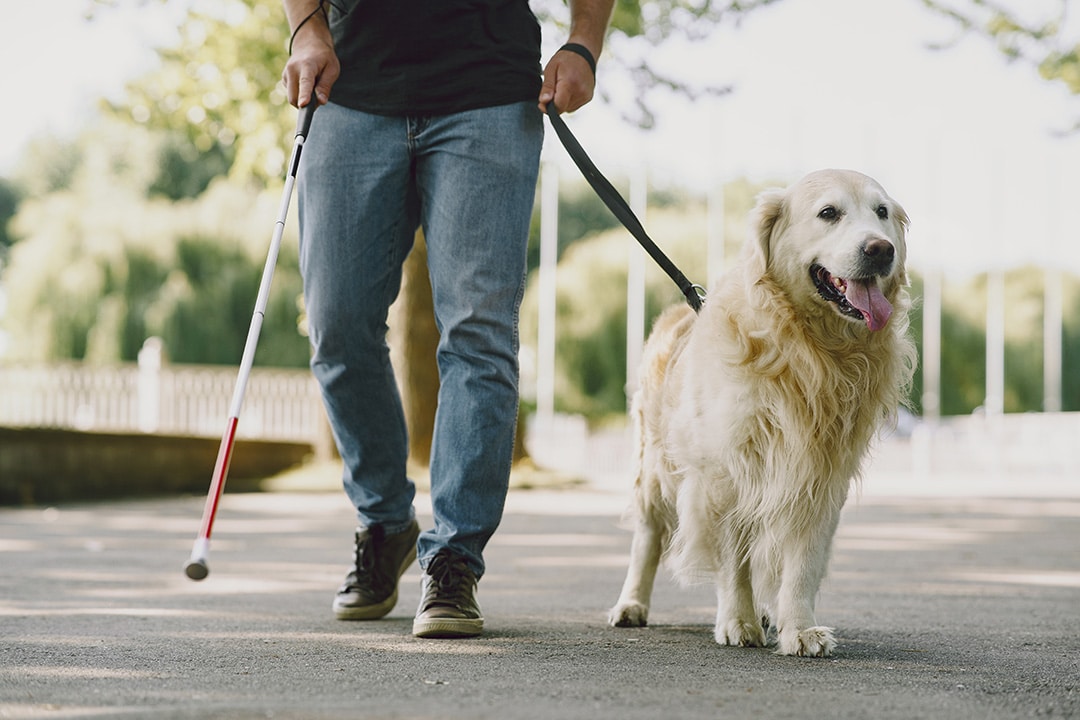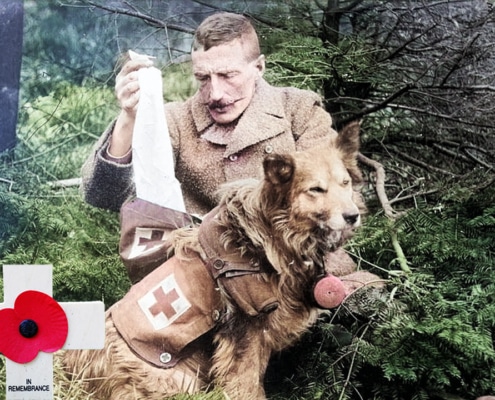Guide Dogs for the Blind
(Seeing eye Dogs)
In 79 AD Vesuvius erupted, it has been discovered that there is a depiction on a wall of a blind man being led by a dog so the idea that having guide dogs for visually impaired people is a new concept is obviously wrong. If the interpretation of the image is correct then it has been going on for over 2000 years.
The first school to train dogs to lead the blind was established in Germany during world war I primarily for the benefit of returning soldiers.
The first guide dogs in Great Britain were presented to veterans on the 6th October 1931 who had been blinded in World War I. They were all German Shepherd Dogs with the names of Judy, Folly, Meta and Flash and in 1934 The Guide Dogs for the Blind Association came into being.
The association holds the world record for the largest number of guide dogs trained by an organisation which at the end of 2016 stood at 33,910
In the USA guide dogs for the blind (GDB) was founded in 1942 and since then 16,000 teams have graduated.
A certain breed…
To be able to cope with the rigours of the job it is accepted that only certain breeds are suited to the task. These have been generally, but not exclusively, Golden Retrievers, Labradors and German Shepherd Dogs. A favoured dog is a Retriever/ Labrador cross
In many countries, it is illegal to prevent a guide dog access to any place that is available to the general public in the same way that is unacceptable to deny access to any service dog. This may include taxis, restaurants, places of entertainment and public transport. Anybody preventing these dogs from working needs to present a certificate from a doctor indicating that their health is threatened by the proximity of a canine. In the UK a number of taxi drivers have been prosecuted for failing to take guide dogs and the majority have been found guilty. They have received heavy fines and in some cases had their licence suspended resulting in them having to reapply for their licence to be returned. Owners of commercial premises have also fallen foul of the law although it appears to me that it is almost inconceivable that anyone can genuinely claim ignorance of their legal requirement.
Religion can sometimes be a barrier as some consider an animal to be unclean but in the UK for instance in 2013 the Islamic Sharia Council ruled that any ban on dogs used for the purpose of guiding is unacceptable. Therefore any refusal to give access to these dogs is discriminatory.
UK Law
Piloted in 2011 in the UK and made permanent in 2012 is the Buddy scheme designed to provide dogs for blind and partially sighted children. These dogs have been bred by the charity but have not qualified to be guide dogs but make very suitable pets. They are highly trained, friendly, well-behaved and assist in the child’s development. This encourages children to be independent and confident in their surroundings.
The need for these dogs just becomes more important with the passage of time. In the UK alone, every day around 4 children are registered blind. This results in around 1,400 potential individuals over a year that will qualify for a dog.
Considering that these organisations rely on donations and receive no government funding their contribution to society is invaluable.
It is a proven fact that the presence of a dog and other animals are beneficial to humans in that they are a source of companionship, assist in reducing stress, reduce blood pressure and generally create a calming atmosphere.
This is no different with a guide dog as when they are at home they are not working and take the role of a pet dog the same as our pets. In fact, because the owner is unable to see their dog then touch takes on a more important aspect in the relationship.
As anyone who has worked with a dog as an essential part of their daily life will confirm the bond is so much stronger than just having a pet no matter how strong the attachment is to that pet.
For those of us who are sighted, it is impossible to understand the contribution that guide dogs are to people who are blind and partially sighted.
“The pleasure of a dog is that you can make a fool of yourself with him and not only will he will not scold you but make a fool of himself as well.”
Julia Turner






